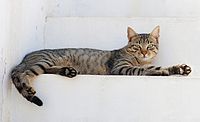
Photo from wikipedia
Neuroscience The gut microbiome influences behavior through interactions with the brain. Lactobacillus reuteri —a bacterium that naturally inhabits the guts of mammals and birds—has previously been shown to restore social… Click to show full abstract
Neuroscience The gut microbiome influences behavior through interactions with the brain. Lactobacillus reuteri —a bacterium that naturally inhabits the guts of mammals and birds—has previously been shown to restore social behavior in mice, but the mechanism behind this effect remains unknown. Sgritta et al. used a variety of autism spectrum disorder (ASD) mouse models (genetic, idiopathic, and environmental) to see whether and how L. reuteri can restore the deficient social behavior in these mice. To do so, the ASD mice were given either L. reuteri or a control vehicle and were tested on an array of social tasks (on which ASD mice consistently showed poorer performance). Not only did L. reuteri significantly improve the social behavior of the mice, but this happened via the vagus nerve and was found to be dependent on oxytocinergic and dopaminergic signaling. Neuron 101, 246 (2019).
Journal Title: Science
Year Published: 2019
Link to full text (if available)
Share on Social Media: Sign Up to like & get
recommendations!